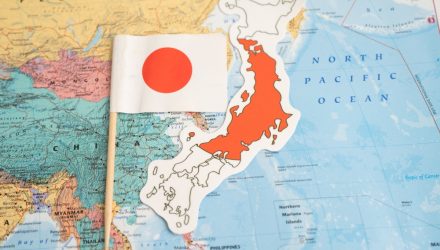It’s often said that the stock market isn’t the economy and this year, Japan is proving that point. While the country is mired in a technical recession, the MSCI Japan Index is higher by 8.47% year-to-date. That’s an advantage of 120 basis points over the S&P 500.
Further proving that point (and that there a better options for accessing Japanese stocks), the WisdomTree Japan Hedged Equity ETF (DXJ) is beating the MSCI Japan Index by better than a 2-to-1 margin. For all the talk about international stocks frustrating U.S. investors, DXJ isn’t doing that. The exchange traded fund is up 54.42% over the past year while the S&P 500 gained “just” 31% over that span.
In other words, DXJ member firms have rallied in the face of economic contraction. Additionally, as speculation mounts that the Bank of Japan could soon be nearing interest rate increases. That was unthinkable as recently as a few years ago. Still, some experts believe the rally by Japanese stocks is rooted in solid fundamentals, implying it can keep going.
Favorable Fundamentals for Japan ETF DXJ
One of the big reasons why Japanese stocks can continue trending higher is that, for years, consumers there have been notoriously tight-fisted. That’s starting to change and if a legitimate pent-up demand scenario unfolds, risk assets could benefit. On that note, DXJ allocates 19.34% of its weight to consumer cyclical stocks – the ETF’s second-largest sector weight behind industrials.
“The ‘forced savings’ of Japanese consumers, estimated at Japanese yen (JPY) 50 trillion, could serve as a catalyst for sustained economic growth as these savings are deployed across a number of different sectors. And never before has Japan looked so exciting for cash-rich domestic consumer,” according to Nikko Asset Management.
There is another potential positive for DXJ holdings. The Tokyo Stock Exchange (TSE) is demanding more accountability and transparency of member firms. This indicates that corporate governance is an increasingly important issue in Japan. That lends itself to the rising willingness of Japanese firms to better engage with investors. This could compel more participants to enter the market.
“Another key indicator of Japan’s readiness for shareholder engagement is the more strategic approach to dividends,” added Nikko. “Current dividend yields of Japanese companies are significantly higher than long-term interest rates, signaling confidence in earnings and an improvement in governance practices. High dividend stocks not only offer attractive income but also low interest rate sensitivity and downside protection, appealing to a wide range of investors seeking both growth and stability in the form of capital and income gains.”
For more news, information, and analysis, visit the Modern Alpha Channel.








